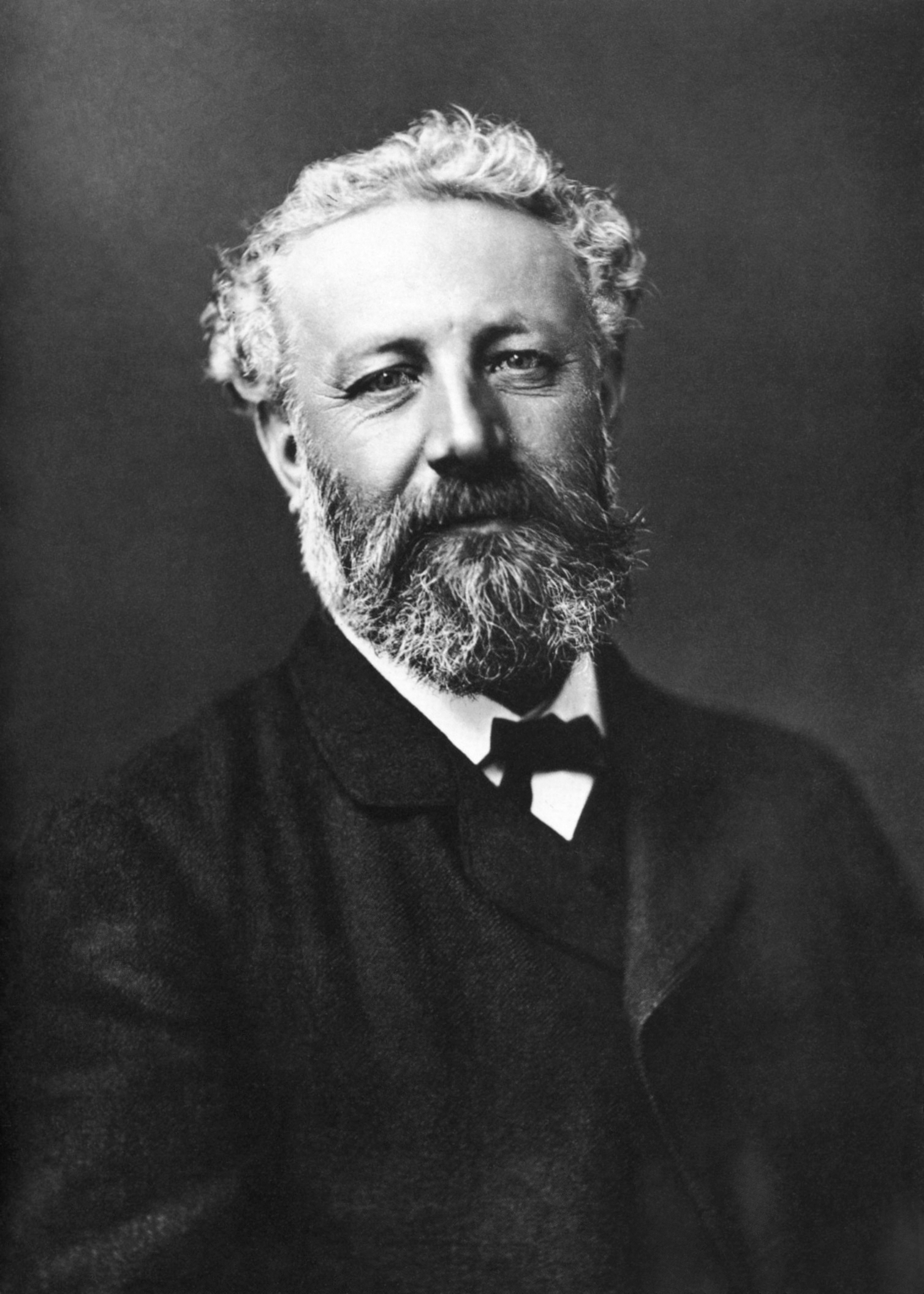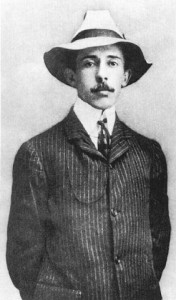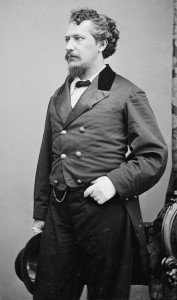From the March 28, 1886 Brooklyn Daily Eagle:
You are currently browsing articles tagged Jules Verne.
Tags: Jules Verne
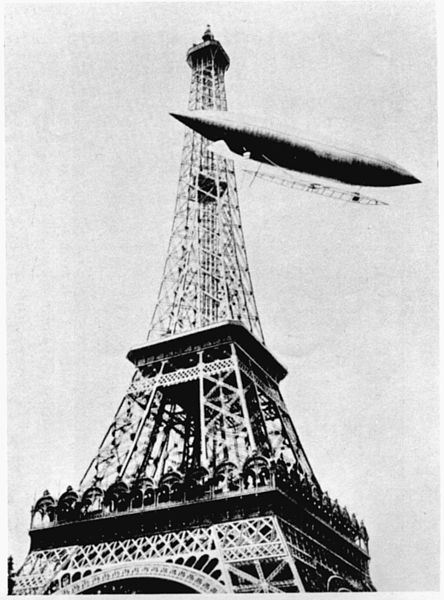
“The enormous crowd which had gathered inside and outside the grounds gave the aeronaut a tremendous ovation.”
Alberto Santos-Dumont, a Brazilian aviation pioneer whose chosen vocation was influenced by early reading of Jules Verne, answered a challenge in 1901 to travel around the Eiffel Tower in his airship within 30 minutes. From a report that year in the October 10th Brooklyn Daily Eagle:
“Paris–Santos-Dumont, who rounded the Eiffel Tower to-day in his airship, started for the first time at 2:29, but on leaving the park his guide rope caught in a tree and he was obliged to descend. He started against 2:42 P.M., rose 250 yards and then pointed for the Eiffel Tower, the balloon going in a straight line.
It was seen, through field glasses, to arrive at the tower and round it. The time, up to that point, with the wind in the balloon’s favor, was eight minutes and forty-five seconds. It returned against the wind and made slower headway, but still kept in true direction for St. Cloud, which it reached in the total time of twenty-nine minutes, fifteen seconds. But instead of descending immediately, Santos-Dumont made a broad sweep over the Aero Club grounds, with the result that another minute and twenty-five seconds were consumed before the workmen seized the guide rope. Thus, technically, Santos-Dumont exceeded the time limit by forty seconds.
The enormous crowd which had gathered inside and outside the grounds gave the aeronaut a tremendous ovation. As his basket came within speaking distance, Santos-Dumont leaned over the side and asked:
‘Have I won the prize?’
Hundreds of spectators shouted: ‘Yes! Yes!’ But the Count de Dion, a member of the committee approached and threw a damper on the enthusiasm by saying:
‘My friend, you have lost the prize by forty seconds.’
The crowd, however, refused to accept this view and a warm discussion ensued, the majority of the spectators taking the ground that Santos-Dumont was entitled to the prize.
The aeronaut, after protesting against the decision of the committee, finally shrugged his shoulders and remarked:
‘I do not care personally for the 100,000 francs. I intended to give it to the poor.’
A number of ladies who were present threw flowers over the aeronaut, others offered him bouquets, and one admirer, to the amusement of the onlookers, even presented him with a little white rabbit.”
Although he’s largely forgotten now, George Francis Train was one of the most famous people in the world in the late 1800s. The inspiration for Jules Verne’s Around the World in Eighty Days, Train was a businessman, politician, lecturer, author, world traveler and all-around larger-than-life character. He was also increasingly batshit crazy in his later life.
Train spent a lot of time during his dotage wandering around Madison Square Park, handing out dimes and refusing to talk to anyone but children and animals. Here’s an excerpt from a June 24, 1888 issue of Brooklyn Daily Eagle, when “Citizen Train” had gone off the rails:
“I overheard a curious conversation in the barroom of the Hoffman House this week between our returned crank, George Francis Train, and a gentleman who had known him as a boy and who was familiar enough with him to still address him by his Christian name. The Sage of Madison Square strode in looking cool, handsome and as sunburned as ever, arrayed from top to toe in snow white duck, and as usual carrying his straw hat in his hand, while his buttonhole was adorned with cornflowers. He called for milk and vichy, the new Summer drink, with the invention of which that other crank, Ruskin, is credited, and while absorbing it was approached by his aforementioned acquaintance, who extended his hand and said genially, ‘Good morning, George. Glad to see you in the city again.’
Before his angry flight to New Brunswick and his somewhat sheepish return, the crank never answered any remark made to him by adults, declaring they took from him ‘Psycho-force.’ But now he considered himself sufficiently strong to withstand the drain of speaking to them and replied ‘Good Morning’ at the same time putting his hands behind his back, and adding, ‘You must excuse me, but I can’t shake hands with you’
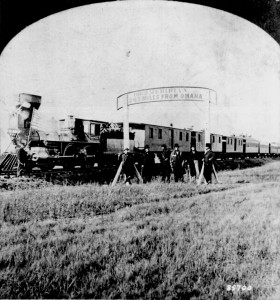
Perhaps inspired by his surname, Train was instrumental in the formation of the Union Pacific Railroad.
‘Why not?’ demanded the other.
‘Because,’ answered the crank, ‘for fifteen years I have never allowed myself to touch man or woman. I should impart a portion of my psychic forces to them and I can not afford to do it. Only lately have I been able even to speak to them.’
‘Oh, bother such nonsense,’ cried his friend impatiently. ‘There’s not the slightest use of the type of talk with me, George. I’ve known you too long. I hoped you would finally have gotten over this absurd craze of yours. It’s a shame that a man with your talents should have wasted your life as you have done.’
Train looked annoyed and uncomfortable and retorted, ‘Why, what have you done yourself to have made your life worth living?’
‘If nothing else,’ replied his friend, ‘I have raised to manhood two noble, manly sons, and that in itself is enough.’
‘Oh, you think so,’ sneered Train. ‘Well let me tell you what I have done. I have stored up in the last fifteen years enough psychic force to enable me to live for centuries, and it’s growing all the time, so that long after you and your two sons are dead I shall be here, passing through the streets people will fall dead before me, so great and irresistible will be my power.’
Five minutes after he was talking with the utmost clearness and shrewdness, concerning some investments in real estate in St. Paul and no one could have believed him the lunatic of fifteen seconds previous.”
Tags: George Francis Train, Jules Verne

